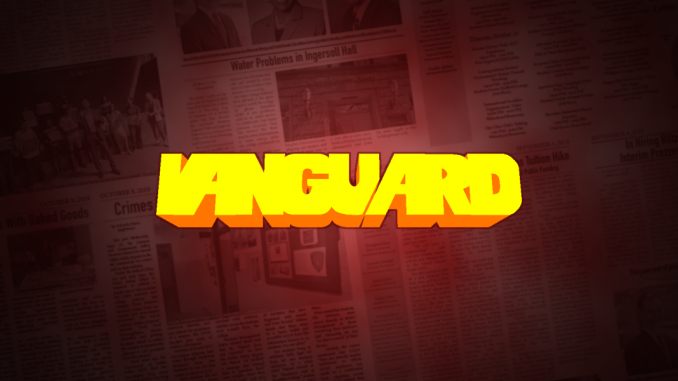
There’s a special thrill in watching a play about your profession – one that accurately captures the details both big and small of what you do day in, day out. That’s not the only reason I so thoroughly enjoyed Branden Jacobs-Jenkins’ “Gloria” – a play set in the unglamorous world of journalism and publishing – but it’s certainly one of them. So many of the little details in “Gloria” seem taken straight out of life in the Vanguard office, whether it’s jockeying over who gets the nicest swivel chair, or casually trolling your colleagues, or stopping everything to do an impromptu office singalong to a 90’s jam.
But at its core “Gloria” is about the dark undercurrent which animates journalism. Most of the events we document, and most of the work we do, is pretty minor. No news is good news, they say – but “no news” isn’t going to further your career. There’s always this nagging temptation to not merely look at life’s horrors, but to feast your eyes on them and regurgitate them back onto the page. Tragedy becomes fodder for your future Pulitzer.
That careerist urge is everywhere in “Gloria,” and it’s exacerbated by the play’s palpable drabness. Caitie Miller’s set design plants us in a subdued office environment, all the better for our pissed-off cast to rage in. Poor Dean (Noah Firth)’s dreams of becoming a writer have all but died, and the highlight of his day is carrying a bag of his boss’s vomit to the trash. It doesn’t help that he’s being hounded by his colleagues/frenemies Kendra (Francesca Manligoy) and Ani (Danielle Kogan). Amidst this back-and-forth sniping sits Miles (Owen Alleyne), the guileless intern slash Harvard undergrad , unaware everyone’s shit-talking him behind his back – how dare he have career prospects, and a bright future ahead of him?
This is perhaps the most resonant part of “Gloria,” provided that you’re a twentysomething journalist – or just a twentysomething, living with the crushing fear that your future prospects are looking bleak, in no small part because the boomers ruined everything. In one of the play’s many great monologues, Kendra excoriates her retirement-age superiors: industry veterans who got their positions not through talent, but by being in the right place at the right time; by coming to New York, as she puts it, “when this city actually accidentally had opportunity in it, and not just the illusion of it.”
No spoilers, but by the end of the first act, her fatalism is proved right in an explosive finale. Unfortunately, the play stumbles after the act break, largely because the actors begin playing different characters, to the play’s detriment. This isn’t because the double- and triple-casting is confusing, mind you – the actors and the costume department (led by costume designer Amy Gallagher) are both up for the task of differentiating the characters. Rather, I think the script doesn’t quite match the quality of the first act – the character drama feels less real, and the media satire significantly broader. I’m not sure whether director Michael Page had the actors ham it up in the third act on purpose to provide further contrast – a move I don’t quite think worked out, if so.
Still, that’s not to say “Gloria” is a bad play – it just didn’t have quite the same personal resonance after act one. I’m not even sure the average theatergoer would notice the drop in quality, if there even is one; most of the audience members I talked to afterwards thought the performance was fantastic all throughout. The acting is certainly top notch, as are all the technical elements, and there’s plenty of food for thought scattered throughout.
So why am I so down on the play, which by any objective measure is fantastic? I think it’s because “Gloria” hit me not as a theatergoer, grateful for a thought-provoking spectacle, but as a journalist, perpetually scanning for errors. Do yourself a favor and don’t make my mistake. View “Gloria” not as an article, but as art.
